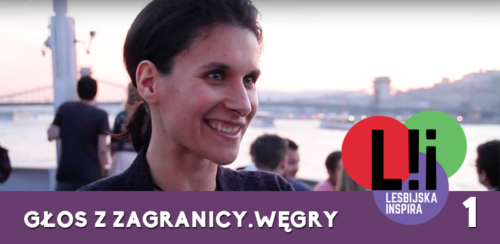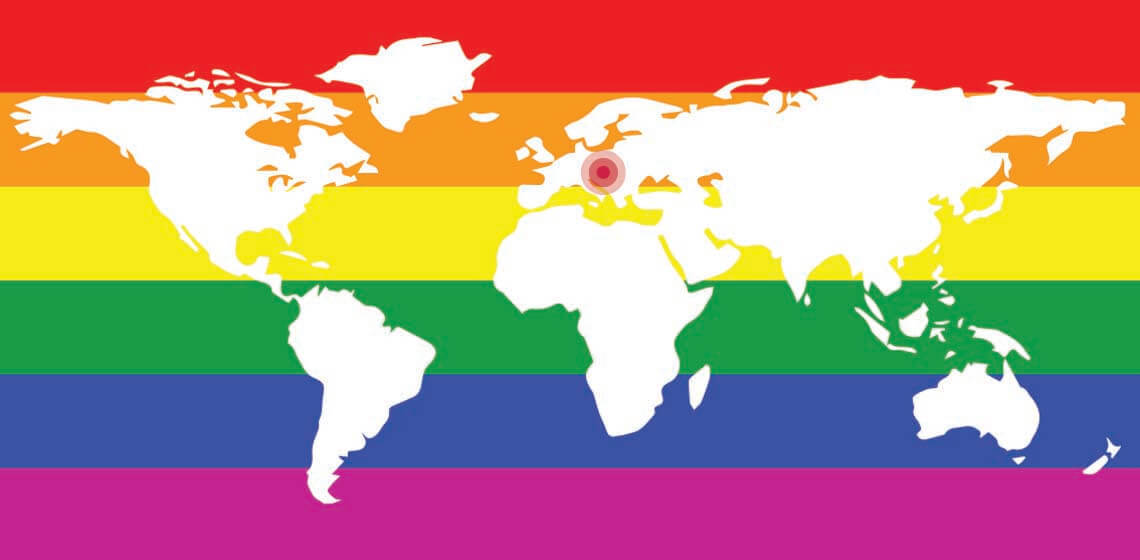February is LGBTQ History Month in Hungary. To honor this occasion, we have decided to publish an unusual interview as part of our series, focusing on Hungary this time.
Anna Szlavi, who is typically the interviewer, switched positions and gave an interview about Hungary, qLit, and identities, to Polish feminist portal Feminoteka. For the original article, in Polish, see the link below.
INSPIRING LESBIANS - Hungary
We were lacking a lesbian environment - so we have created it. Interview with Anna Szlávi

Magdalena Wielgołaska (Feminoteka): To start with, can you tell us how you define and describe your identity?
To be honest, I don’t like labels. In fact, I have been fighting against them all my life. My general experience in life has been that “I am different,” and I have come to realize early on that this sensation had a lot to do with society’s compulsion with labelling. As a consequence, I generally refrain from attaching labels to my identity, or to others’, as I consider them limiting, excluding, and misleading.
As for my sexuality, it has been fluid and flexible. Historically I’ve been attracted to and in love with women and men as well. Even if in the last decade I predominantly fell in love with women, I still feel that the concept of “lesbian” would be oversimplifying my experience of attraction.
MW: What is your attitude towards this word?
I don’t have bad associations, even if my country undoubtedly does. My resistance to call myself one comes simply from the sensation that it doesn’t truly define me. Like I said, I tend to avoid labelling myself and others, to make space for a more complex picture.
MW: As I understand, you have always felt you were different. How did this affect your relationships? Have you always been aware that your identity was fluid?
Actually, it was in college that I fell in love with a girl for the first time. We found such a profound and intense passion for each other that there was no way we could stop and think about it. It just happened, and only when we were already in love did we find a “label” to it. I was in Italy, on as Erasmus semester, which was the best timing, because in my dorm there was a lesbian couple - the first lesbians I (realized I) knew - so I had someone to talk about it with. When I came back to Hungary, and when we broke up, I started to discover the Hungarian LBTQ+ scene, which I had totally been unaware of. To be honest, I was very dissatisfied with what I found.
MW: Why?
Because there was practically no community life in Hungary. Later I spent two semesters in the US, witnessing active and successful LGBTQ+ centers and communities, which transformed me and made me feel, upon my return, that I was ready to make some changes.
MW: You are one of the founders of qLit, which you clearly define as a Hungarian “lesbian” magazine. I understand that this is an element of political activity to strengthen a marginalized group.
Exactly. In Hungary the term “lesbian” has negative connotations. It is precisely because of this that, when labelling our audience, we chose to use the word lesbian*. The asterisk at the end of the word is meant to signal that it is an umbrella term for “women loving women,” that is, not exclusively for lesbians.
I have to admit, in the beginning it required conscious efforts from each of us to use the word in our articles, exactly because of its negative cultural connotations, but I think by creating so much positive content around it we have managed (at least to some extent) to reframe the L-word in Hungary.
At the same time, I don’t know any alternative term that LBTQ+ women could use to define themselves with. Perhaps there is “buzi,” which is the re-interpretation of derogatory “faggot,” but it is a controversial usage and I personally don’t like it.
MW: Can you say a bit more about qLit Magazine? Who creates it, what do you want to achieve, and so on?
qLit Magazine was created almost 2 years ago, with the intention to build, or as a matter of fact, to create an LBTQ+ community. All three founders, Dorka, Eni, and I, thought there was almost nothing we could call a lesbian community life in Hungary, and we felt it was high time we changed it.
The project started as a magazine but the primary and eventual goal was to organize events where women can meet face to face, not just in virtual space. The magazine content prepared the grounds for this, and since our articles and campaigns proved to be successful in a short time, after one year of operation we launched four, already real-life, projects. We have regular speed dating events, pub quizzes, and improvisation performances, and weekly table tennis evenings. We notice that young and not so young LBTQ+ women in Hungary are ecstatic that they can get to know each other and build a community that combines different activities. This journey has been incredibly reinforcing for us, founders of qLit, as well; we can witness as we are achieving what we had dreamed of in the beginning: creating a space where women feel good, free, and happy to be part of the community.
MW: Your experiences are an interesting example of activating non-heteronormative women, especially when the political situation in your country is dynamic and difficult. What is the future of lesbians * in Hungary?
It's hard for me to predict what the future will bring for LBTQ+ women in Hungary. On the one hand, the growing social awareness and acceptance for the LGBTQ+ community is very clear. People notice our presence in an increasing number of areas of social life and we witness positive changes. On the other hand, Hungary’s gender gap is one of the widest within the EU, and regarding political representation it is among the worst, not just in Europe but in the world. The political situation is not getting any better; on the contrary, there has been a wave of passionate (sometimes even violent) protests against Orbán’s government. People are starting to realize that the political elite can and will do anything they want. This is why it is hard to make predictions for a marginalized group such as LBTQ+ women in Hungary.
MW: Thank you very much for the interview and I hope we will stay in touch to exchange experiences.
Thank you. I’ll keep my fingers crossed for the Polish LBTQ+ community.

